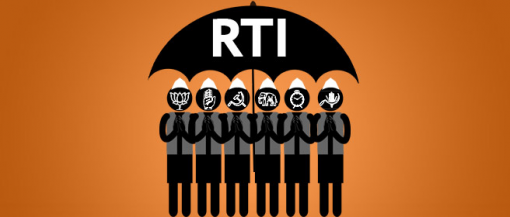
The Supreme Court issues notices asking why the six political national parties should not come under the RTI.
Happy days may soon be over for the six recognised national political parties – Indian National Congress, Bharatiya Janata Party, Communist Party of India (Marxist), Communist Party of India, Bahujan Samaj Party and Nationalist Congress Party.
The Supreme Court today accepted a writ petition aimed at ensuring more transparency and accountability by bringing them under the ambit of the Right to Information Act, 2005, as “public authorities”.
The big six, in a rare show of solidarity, have on many occasions come together to stonewall compliance with the RTI.
For a quick recap of the journey so far to bring the six political parties under the RTI, check this out.
To cut a long story short, none of the parties was kicked about coming under the RTI because that would mean complete transparency and accountability, especially when it comes to funding. Of course, they cited reasons like lack of manpower to cater to RTI queries. Right.
The 2013 CIC judgement, however, elucidated how political parties are not private institutions but public authorities that should come within the purview of the RTI.
Here’s what the petitioners had contended: “As the Political Parties are the life blood of the entire constitutional scheme in a democratic polity and as they are indirectly financed by the Central Government and the State Governments in various ways, as discussed hereinabove, the Political Parties need to be declared public authority under section 2(h) of the RTI Act.”
The CIC asked the six parties to appoint Central Public Information Officers and appellate authorities within six weeks. That never happened.
Though for the longest time, the post of Central Information Commissioner remained vacant, a complaint was filed by the Association of Democratic Reforms and RTI activist Subhash Aggarwal before the CIC to look into non-compliance.
Curiously, the CIC Bench ordered on March 16, 2015 that it could not make political parties comply with its own judgement. The senior-most Information Commissioner on the Bench, Vijai Sharma, was on June 18, 2015, appointed as the Chief Information Commissioner.
“The Supreme Court has done the right thing, hopefully, it will undo the damage done by the CIC while saying it did not have any power to get its own decision implemented,” said ADR Founder Jagdeep Chokkar.
“It’s unfortunate that political parties, so-called lawmakers, have become lawbreakers. If they don’t consider themselves public authorities then they should stop accepting government funding and income tax exemptions on party donations,” added Aggarwal.
What CIC could not ensure, the Supreme Court may now make happen. It has, today, admitted the writ petition and sent notices to the Centre, the Election Commission, and the six political parties asking why they have been reluctant to comply with the RTI so far. Watch this space to find out what they come up with this time.
This article has been republished from Newslaundry.com.